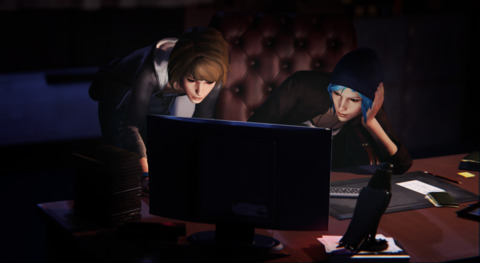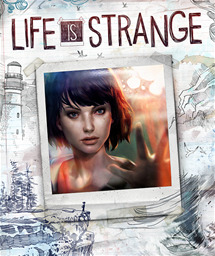
The end of year sprint rolls on and the past few days had me playing 2015’s best selfie simulator, Life is Strange. This episodic game first came out at the start of this year and has been building on its buzz ever since. The game tells the story of 18 year old Max Caulfield as she begins her senior year of high school at the prestigious Blackwell Academy in her old hometown of Arcadia Bay, Oregon. One day, she witnesses the murder of her old childhood friend, Chloe, and in that moment discovers that she has the ability to rewind time, which she immediately uses to prevent the murder. From there the game spins a fascinating tale that has some thoughtful things to say about the nature of choice and consequence. After playing it I can say that the game lives up to its hype and then some. Life is Strange can be at times charming, sweet, agonizing, and altogether crazy, but it remains riveting the whole way through.
There’s something about high school as a setting that makes it ideal for video games. It’s a time in your life where you have some freedom, but there are typically still hard restrictions on where you can go and what you can do. In essence, it allows for developers to create dense worlds that are inherently intimate. Bully remains the gold standard in this regard, as the Bullworth Academy campus and surrounding town have a liveliness to it that no other Rockstar game could match. Furthermore, the relatively small amount of people you repeatedly interact with in high school makes it a perfect scenario for developers to create strong character focused narratives, such as those seen in the Persona series. But above all that, high school settings evoke a sort of nostalgia that allows these games to connect with us on a deeper level.
Now, keeping in mind that I’m writing in generalities, there is a great value in exploring common life experiences in video games. High school in particular is an almost universal experience, and as such the setting can have a powerful effect on how we engage with the game. For some, high school games may be a way of reliving some of the best parts of their lives, while for others it may be a power fantasy to succeed in a place where in real life they were miserable. It’s also a way for us to reflect on how far we’ve come since our awkward teenage days and what we would have done differently had we known then what we know now. High school as a concept plays into this notion that the time spent as a teenager is one big experiment where we are able to try on new personalities and explore new ways of thinking as we slowly chisel out our identities. Video game representations of high school seem to be at their best when they embrace this nature to experiment.
Life is Strange uses its time rewind mechanic to encourage the player to experiment, and even interweaves this experimentation into its narrative. Did you accidentally call a classmate by the wrong name? Rewind and get another chance to avoid social awkwardness. Want to see what a kiss would be like with your friend of the same gender? Give it a shot and rewind if you don’t like how it turns out. At first this seems to render the choices you make pointless, but in fact only serves to heighten the intensity of each decision. The player now frets about every little choice, balancing the conflicting priorities of your friends, teachers, parents, and yourself. Despite the intensity of these decisions, the safe environment of high school makes it so these decisions don’t really matter, and Life is Strange reflects this in its design. But there are certain times as we grow up that we must make decisions that do matter, and the game brilliantly subverts its own mechanics to deliver those moments.

Most of us aren’t still with the same friends or romantic partners we chose in high school. Likewise, our tastes in books, music, movies, and video games, as well as whatever personas we had in high school, have all likely changed as we proceed to adulthood. But there are a few decisions that we have to make that have far reaching consequences, and oftentimes they sneak up on us. We may choose to spend time with peers that bring us up or pull us down, we may choose a career path that leaves us enriched or empty, or we may choose to engage in vices that open our minds or leave us to struggle with addiction. To mirror these critical and sometimes unexpected moments, Life is Strange ingeniously makes us deal with a few major decisions without our time rewind safety net. The choices the player makes are immediately set in stone, and the player is simply forced to reckon with the consequences. It doesn’t feel fair, but then again, it isn’t supposed to be fair. Max, like the rest of us, must come to terms with the fact that the world is not just, and sometimes there simply is no silver lining.
Life is Strange seems to have really connected with a certain group of players that have made for a thriving community online. It did this by infusing the essence of being a teenager into every aspect of its production. Sure, you can point to the extensive journal entries or the awkward use of slang as examples of the game trying too hard to be cool, but it deeply understands the awkward yet hopeful phase that is high school. It’s certainly not a perfect game, especially when the narrative stumbles a bit in episode 5, but through it all the characters remain extremely well written and relatable, which creates a climax that rivals the story’s previous emotional highs. Regardless of the quality of the final chapter, the Max’s journey through Arcadia Bay will remain one of my favorite gaming memories this year.

Log in to comment